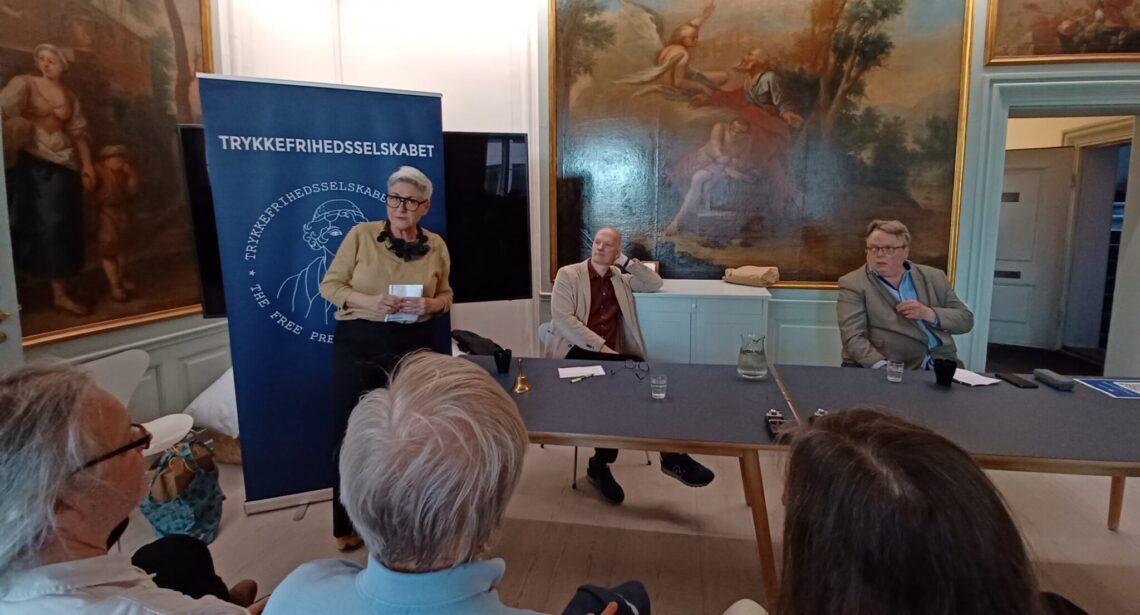On 28 April, Trykkefrihedsselskabet organised a debate in Copenhagen based on J.D. Vance’s speech in Munich on democracy and freedom of expression in Europe.
The debate was between author Kasper Støvring and author and historian Morten Uhrskov Jensen. Their political views overlap to a large extent, and they know each other privately. This could have resulted in a boring and uninteresting discussion. Fortunately, this was not the case.
The debate was very engaging, not least because both debaters are very eloquent and knowledgeable. Støvring talked about authoritarian liberalism, and how the EU and other actors aggressively try to censor or ban views they don’t like.
EU’s undermining of democracy
Kasper Støvring pointed out how the EU’s power elites are undermining democracy. They fear their own citizens, as US Vice President J.D. Vance pointed out during a visit to Munich, Germany.
This repression takes place through judicial activism, where courts with activist lawyers consistently interpret laws in a progressive direction and remove decisions from democratic control.
Censorship and condemnation of dissenting views are also used under the guise of combating “misinformation”.
Political issues are redefined as legal issues, and conventions and human rights are used to block elected majorities, particularly on immigration issues.
From Sweden to France, the UK, Germany and Romania, we are now seeing a pattern: Censorship, criminal prosecution and moral condemnation are systematically used to silence critical voices and political parties.
Morten Uhrskov Jensen rightly pointed out that history doesn’t always move slowly, like a glacier. Sometimes events happen extremely fast, like an avalanche. And those who have the best skills, organisation and willpower to exploit the events will have the opportunity to shape the future.
Uhrskov Jensen also mentioned the modern classic Human Accomplishment: The Pursuit of Excellence in the Arts and Sciences, 800 B.C. to 1950, a 2003 book written by American political scientist Charles Murray. Murray ranked 4,000 leading innovators in a variety of areas of human achievement from 800 B.C. to 1950. Whether measured in people or events, 97 per cent of the world’s most important achievements in science occurred in Europe and North America. Europe’s global dominance in science until the mid-20th century is completely overwhelming.
Having analysed this book very thoroughly myself, I am convinced that the conclusions of Charles Murray in Human Accomplishment are essentially correct. Europeans have much to be proud of. Yet we are told that we should be ashamed of our past, but proud to be open and tolerant today.
For me, it’s the opposite. I am proud of much of what Europeans have achieved in the past. I am not proud of how we behave today. Europe now appears as a weak, decadent and exhausted region, increasingly less important to the world economy, a giant pimple on Asia’s arse.
From the 15th century to the early 20th century, Europe was effectively the brain of the world. The Scientific Revolution changed humanity’s view of the universe, founded modern physics and chemistry and enabled humans to communicate at the speed of light.
Europe, the anus of the world
Today, it would be more accurate to describe Europe as the anus of the world: All the rubbish ends up here. Got unwanted criminals you want to get rid of? Just dump them in Europe. Everyone else seems to be doing it.
Europe has been reduced from being the world’s most innovative continent to a ruined dumping ground for other countries’ problems and surplus population.
How Europe went from being the world’s brain to becoming the world’s anus is an interesting topic for debate. If you’re a European, however, you probably also want to know if this trend can be reversed, and if so, how.
It’s impressive that Morten Uhrskov Jensen, at the age of 61, can still exude youthful optimism, but sometimes he does. As he writes in his book National Conservative Renaissance from 2023, he hopes for a new European renaissance.
Let’s be optimistic and say that Europeans still have large enough reserves of strength, culture and roots to draw from to achieve this. Maybe that can be true. But we have to survive first before we can flourish again, and now it is truly our survival that is at stake.
Charles Murray finished his book Human Accomplishment in 1950, when the atomic age, the computer age and the space age were all in their infancy. If you visited Europe in 1950, it was still predominantly Germans living in Germany, Brits living in the UK, French living in France and Italians living in Italy. This has changed dramatically in the generations since then.
Much of Europe, especially Western Europe, would be completely unrecognisable to a time traveller from 1950. White Britons today are a shrinking minority in London and Birmingham, the UK’s two largest cities. A similar demographic upheaval is happening rapidly across Europe, from Athens in Greece to Dublin in Ireland. Parts of Paris are unrecognisable as French, or even European.
There are more Muslims than Catholics in schools in Vienna, Austria. Moroccans shoot each other in Amsterdam. Afghans set off bombs in Stockholm. Rival clans of Chechens, Syrians, Kurds and Turks fight each other in German cities. Illegal African, Arab and Pakistani immigrants harass locals in Barcelona, Rome and Milan.
Old and proud European nations are being displaced and wiped out before our eyes, due to the immigration policies promoted by the power elite and the EU. If these policies are not urgently reversed, and the ruling power elite replaced by people who protect our national interests, there will soon be little left of European civilisation from which to create a new renaissance.

